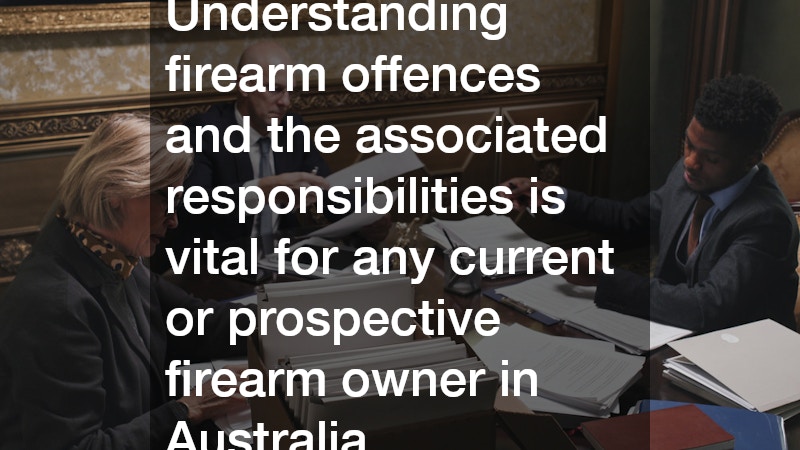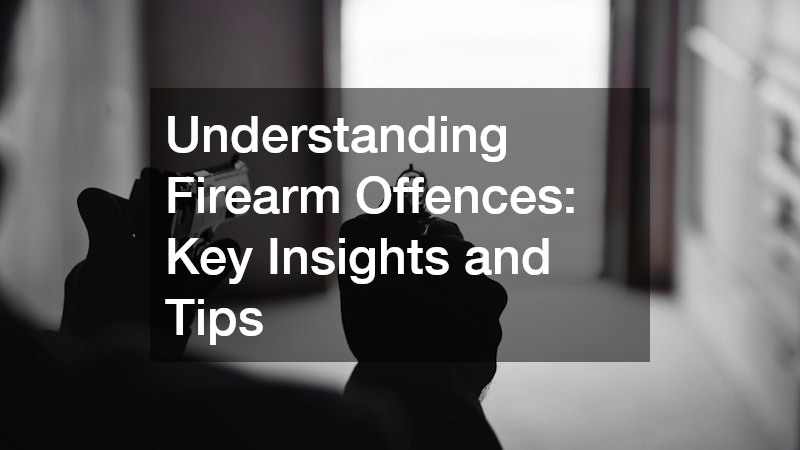Navigating the legal landscape of firearm-related laws in Australia requires a firm understanding of both federal and state-level legislation. A firearm offence is taken extremely seriously under Australian law, given the potential implications for public safety and the strong societal stance against gun violence. As such, it is essential for individuals—whether licensed firearm owners or not—to understand the nature of firearm offences, the consequences of breaching firearm laws, and the importance of compliance with regulations.
This article delves into the key insights and tips that can help clarify the complexity of firearm offences across the country.
Definition and Scope of Firearm Offences
In Australia, a firearm offence encompasses a range of criminal activities involving guns or other prohibited weapons. These can include unlawful possession of a firearm, carrying a firearm without a valid licence, using a firearm in the commission of a crime, or failing to store firearms securely. The laws governing these offences vary between states and territories but are all underpinned by a shared national approach to minimise firearm-related risks.
Most firearm offences fall under legislation such as the Firearms Act 1996 in various jurisdictions, which outlines the requirements for ownership, registration, storage, and usage. A person found in possession of an unregistered firearm or a prohibited weapon may face significant penalties, including imprisonment, heavy fines, or both. The scope of these laws also extends to replicas, air rifles, and paintball guns, depending on jurisdictional interpretation.
Licensing Requirements & Common Pitfalls
Acquiring a firearm legally in Australia is a regulated process that involves background checks, character assessments, and an approved reason for ownership. Applicants must complete a firearm safety course and demonstrate a genuine reason for possession, such as hunting, sport shooting, or occupational necessity. Once licensed, individuals are subject to ongoing responsibilities, including renewing their licence, complying with secure storage obligations, and notifying authorities of changes in circumstances.
Despite the clarity of the licensing process, one of the most common causes of a firearm offence is non-compliance with licence conditions. This can occur when individuals fail to renew their licence, neglect safe storage protocols, or allow unauthorised persons to access their firearms. Even minor lapses in following procedural requirements can result in criminal charges, reinforcing the importance of constant vigilance and adherence to the law.
Penalties & Legal Consequences
The penalties for committing a firearm offence in Australia are intentionally severe to deter misuse and protect the broader community. Depending on the severity of the offence and the jurisdiction, penalties may include imprisonment ranging from several months to more than a decade. Aggravating circumstances—such as carrying a firearm during the commission of another offence, or possession of a prohibited or automatic weapon—often result in harsher sentencing.
Courts take a firm stance on firearm offences due to their potential for harm, and judges may impose custodial sentences even for first-time offenders. Additionally, a conviction for a firearm offence can have long-term repercussions, including a permanent criminal record, loss of firearm privileges, and restrictions on travel or employment opportunities. Legal representation is highly advisable for anyone charged with a firearm-related crime, as legal professionals can help navigate the nuances of state-specific laws and advocate for reduced penalties or dismissal where appropriate.
Importance of Safe Storage & Handling
Proper storage and handling of firearms are not only legal requirements but also critical safety measures. Every Australian jurisdiction mandates that firearms be stored unloaded in a locked container that meets specific security standards. Ammunition must be stored separately or in a locked compartment within the firearm safe. These rules are enforced to prevent theft, unauthorised use, and accidents, particularly in households with children or vulnerable individuals.
Failure to adhere to these storage rules can lead to a firearm offence even if no other criminal activity occurs. Regular inspections by authorities, especially for Category C or D firearms, ensure compliance. Gun owners should proactively review and upgrade their storage solutions, keeping up to date with any changes in legislation or best practice recommendations.
Navigating Legal Support & Compliance
If you are accused of committing a firearm offence, securing timely legal advice is essential. A qualified criminal lawyer can assess the strength of the prosecution’s case, explore possible defences, and provide strategic guidance throughout the legal process. In some cases, a firearm offence may arise from misunderstandings or unintentional breaches of the law, such as unknowingly possessing a firearm with an expired licence or transporting it incorrectly.
Legal professionals can also help with appeals, licence reapplications, and negotiating with police or prosecutors. Moreover, firearm owners seeking to ensure ongoing compliance should stay informed about legislative updates, attend refresher training courses, and consult legal professionals if in doubt about specific legal obligations.
Staying Informed & Responsible
Understanding firearm offences and the associated responsibilities is vital for any current or prospective firearm owner in Australia. With strict laws designed to protect public safety, even minor lapses in judgement or knowledge can result in serious consequences. By maintaining up-to-date knowledge of firearm regulations, ensuring all licensing and storage requirements are met, and seeking professional guidance when needed, individuals can lawfully and responsibly own firearms without falling afoul of the law.
Firearm ownership in Australia is a privilege that carries with it a heavy burden of responsibility. By staying informed and proactive, firearm owners can avoid the pitfalls that lead to a firearm offence and contribute to a safer, more secure society.

